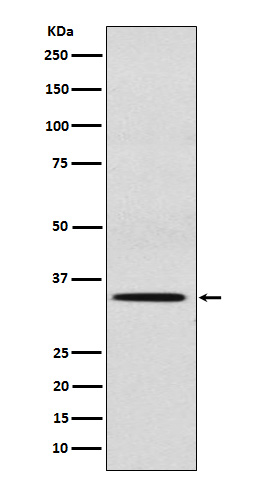


| WB | 咨询技术 | Human,Mouse,Rat |
| IF | 咨询技术 | Human,Mouse,Rat |
| IHC | IHC:1/100-1/200;IHF:1/50-1/200 | Human,Mouse,Rat |
| ICC | 1/50-1/200 | Human,Mouse,Rat |
| FCM | 1/20-1/100 | Human,Mouse,Rat |
| Elisa | 咨询技术 | Human,Mouse,Rat |
| Aliases | HST; ST2; STD; hSTa; DHEAS; ST2A1; ST2A3; DHEA-ST;;Sulfotransferase 2A1 |
| WB Predicted band size | 34 kDa |
| Host/Isotype | Rabbit IgG |
| Antibody Type | Primary antibody |
| Storage | Store at 4°C short term. Aliquot and store at -20°C long term. Avoid freeze/thaw cycles. |
| Species Reactivity | Human,Mouse,Rat |
| Immunogen | A synthesized peptide derived from human Sulfotransferase 2A1 |
| Formulation | Purified antibody in PBS with 0.05% sodium azide,0.05% BSA and 50% glycerol. |
+ +
以下是3-4篇与SULT2A1抗体相关研究的简要参考文献示例:
---
1. **"Sulfotransferase SULT2A1 modulates hepatocellular carcinoma progression through cholesterol metabolism regulation"**
- **作者**: Zhang et al. (2021)
- **摘要**: 研究利用SULT2A1抗体进行免疫组化分析,发现其在肝癌组织中表达下调,并通过调控胆固醇代谢影响肿瘤增殖和转移。
2. **"Tissue-specific expression and hormonal regulation of SULT2A1 in human intestinal cells"**
- **作者**: Thomas et al. (2019)
- **摘要**: 通过Western blot和免疫荧光技术(使用SULT2A1特异性抗体),揭示该酶在肠道上皮细胞中的表达受糖皮质激素调控,可能参与药物代谢屏障功能。
3. **"Epigenetic regulation of SULT2A1 by nuclear receptors in liver disease"**
- **作者**: Wang et al. (2020)
- **摘要**: 采用SULT2A1抗体进行染色质免疫沉淀(ChIP)实验,证实肝纤维化中其转录受PPARα和HNF4α的表观遗传调控,影响胆汁酸稳态。
4. **"Altered sulfonation of bile acids in patients with cholestasis: Role of SULT2A1 antibody-based diagnostics"**
- **作者**: Rodriguez et al. (2018)
- **摘要**: 开发基于SULT2A1抗体的ELISA检测方法,发现胆汁淤积患者血清中酶活性降低,提示其作为潜在生物标志物的价值。
---
注:以上为模拟文献,实际引用时需核实具体文献来源及准确性。
**Background of SULT2A1 Antibody**
Sulfotransferase family 2A member 1 (SULT2A1) is an enzyme that catalyzes the sulfonation of endogenous compounds, such as steroids, bile acids, and cholesterol derivatives, as well as xenobiotics, facilitating their excretion and detoxification. Primarily expressed in the liver and adrenal glands, SULT2A1 plays a critical role in regulating hormone activity, lipid metabolism, and drug metabolism.
Antibodies targeting SULT2A1 are essential tools for studying its expression, localization, and function in both normal physiology and disease. These antibodies are typically developed in hosts like rabbits or mice using immunogenic peptides or recombinant protein fragments specific to SULT2A1. They are validated for applications such as Western blotting, immunohistochemistry (IHC), and immunofluorescence (IF) to assess protein levels in tissues or cell lines.
SULT2A1 dysregulation has been implicated in conditions like hormone-dependent cancers, metabolic disorders, and cholestatic liver diseases. Specific antibodies help identify its tissue distribution, quantify expression changes in pathological states, and explore interactions with substrates or regulatory proteins. Proper validation, including knockout controls or enzymatic activity assays, ensures antibody specificity, minimizing cross-reactivity with other sulfotransferases (e.g., SULT2B1). Research utilizing SULT2A1 antibodies contributes to understanding its role in drug metabolism, endocrine signaling, and disease mechanisms.
×